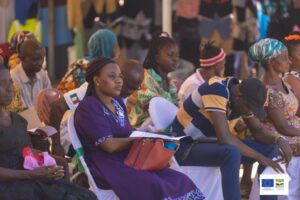By Kizito CUDJOE
The European Union (EU) has committed €1.718million to the ‘Building Resilient and Active Communities in Extractive Landscapes in Ghana (BRACE)’ project, demonstrating its dedication to promoting responsible mining practices in the country.
The three-year initiative aims to ensure the protection of both the environment and the communities within mining areas.
The BRACE project, guided by A Rocha Ghana and implemented by a consortium of non-profit organisations, including WACAM and the Nature and Development Foundation (NDF), is expected to transform the mining sector.
It seeks to promote a culture of respect for human rights, transparency and accountability in mineral governance.
By advocating sustainable and fair environmental management, the BRACE project is envisaged to reshape the extractive industry’s landscape of the country, demonstrating the EU’s longstanding commitment to upholding social and environmental rights in the mining sector.
Mining, undoubtedly crucial for local economies in generating jobs and revenues, must not come at the expense of irreversible damage to communities and ecosystems.

The Head of Cooperation at the EU Delegation to Ghana, Massimo Mina, emphasised the urgent need for a responsible mining sector that minimises environmental impacts and maximises socio-economic benefits for local populations.
Mr. Mina, who spoke at the launch of BRACE in the Asutifi North District of the Ahafo Region, noted that irresponsible mining practices by both licensed and unlicensed mining operators in the last two decades have resulted in serious negative environmental and social impacts.
“Communities residing near large-scale mining sites endure loss of lands, contamination of water sources by toxic substances and health diseases. Many communities have been stripped of their rights, left voiceless and devoid of channels for seeking justice,” he stated.
“Recent legislation facilitates large-scale mining in forest reserves and Ramsar sites, threatening the remaining natural forests and biodiversity of the country. Classified forests have been ‘declassified’ based on simple administrative decisions – i.e. without involving the Parliament – to issue new exploitation licensees,” he added.
Given these issues, he said there is an urgent need for Ghana to redirect its legal framework toward sustainability, enforce the implementation of existing laws, and ensure full compliance with internationally recognised principles of responsible business, good governance and human rights.
Dr. Seth Appiah-Kubi, the National Director of A Rocha Ghana, highlighted the importance of recognising the diverse interests inherent in our landscapes.
From food and water security to sustainable forest management and climate resilience, he said the mining industry must adopt a balanced framework that respects community rights and ensures equitable benefits from various land uses.
The Project Coordinator, Daryl Bosu, called for the incorporation of social and environmental safeguards into Ghana’s minerals and mining policy.
He noted that embracing principles such as Free, Prior, and Informed Consent (FPIC) is essential for promoting responsible mineral governance, especially given the increasing demand for transition minerals.










